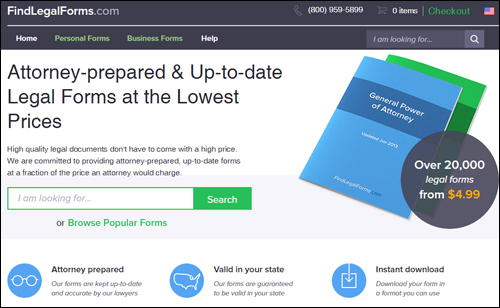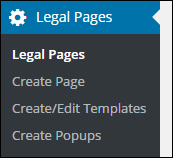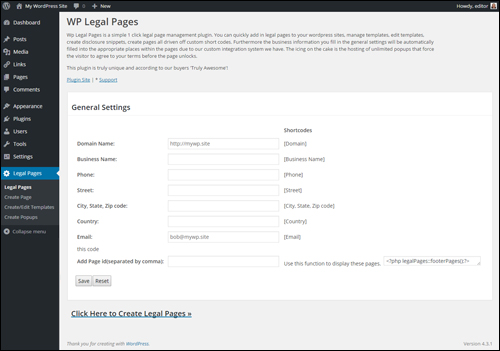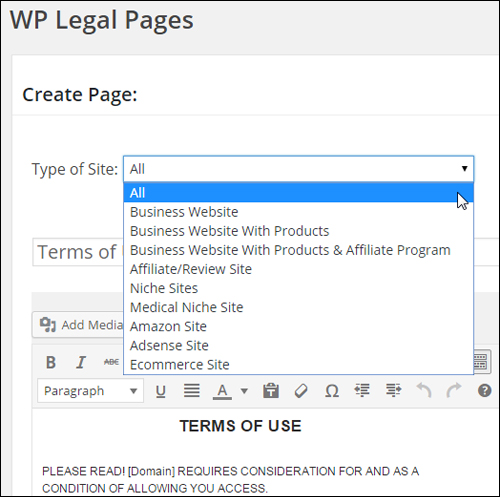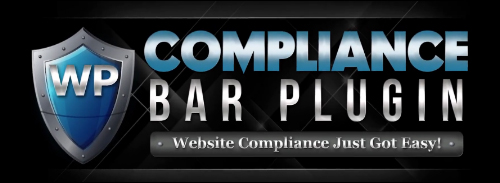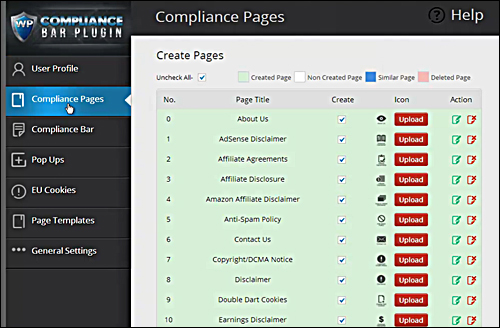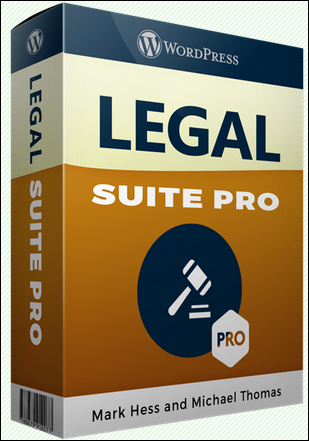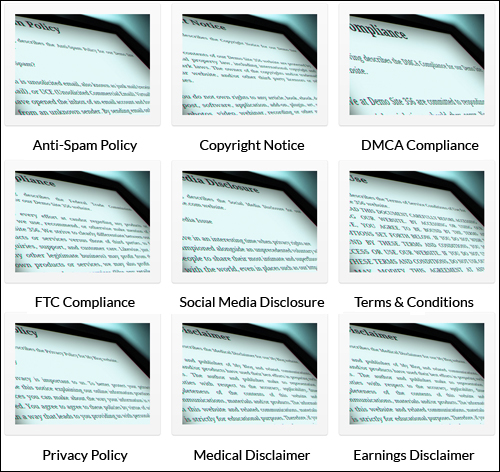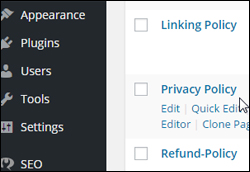
Is your WordPress site compliant? Do you know if you are breaking the law, or contravening the Terms of Service (TOS) of any third-party companies whose services or products you recommend or sell?
Online laws, regulations, and guidelines were designed to protect consumers and apply to anyone who markets, sells or promotes products or services online. Anyone who owns a website risks being sued for not following compliance laws. Feigning ignorance about legal requirements will not prevent someone from taking legal action against your business.
New laws introduced in 2014 regulating how businesses promote advertising on their sites clearly state that if you promote anything on your website for commercial gain, then you need to follow certain disclosure guidelines to prevent enforceable orders being issued against you by regulatory departments, such as the Better Business Bureau, also called the BBB. Do a search online for “The Online Interest-Based Advertising Accountability Program,” which regulates behavioral advertising across the internet for more details.
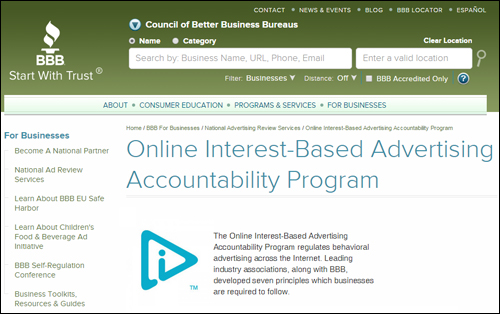
(Better Business Bureau)
The new laws affect several business activities, including:
- Any type of advertising, like Google AdSense
- Retarget Marketing
- Google Analytics (or other analytics software)
- Affiliate Marketers
- Product Creators
- Bloggers
- etc.
If your website does not display certain pages to visitors (e.g. terms of service, privacy statement, earning disclaimers, etc.), many sites like Google won’t let you advertise, online merchants like ClickBank won’t allow you to list digital products, PayPal could suspend your account, Facebook will reject your applications, and you will not be accepted into a range of advertising or affiliate merchant networks.
If your online business is not in compliance, you could end up facing a whole range of penalties, including fines, having your website shut down, even jail time!
The purpose of this post is to make you aware that your website or blog(s) may be required to comply with legal requirements, the importance of remaining compliant with the terms of service of 3rd-party providers whose products or services you may be selling online, and that there are easy solutions that can help your website become more compliant, such as the tools that we discuss further below.

Does Your Site Comply With All Legal Requirements?
![]()
Legal Disclaimer: We are not lawyers and we do not provide legal advice. You must do your own due diligence and consult a legal expert about the best way to ensure that your website is compliant with all laws wherever you do business.
Why Making Your Website Compliant Is Important
Consider for one minute what could happen to your business if any of the following were to take place:
- Someone has a heart attack after using your online fitness workout.
- The skin cream you promote as an affiliate gives someone skin rashes.
- You’ve informed subscribers that you won’t sell their information, but you have not spelled out exactly what you will do with their personal details.
- Someone copies your content and publishes it on their own site.
- There is no statement on your website or blog making your site visitors aware that you are marketing a product as an affiliate and may get paid a sales commission if visitors buy products using your link.
- You haven’t spelled out the terms and conditions of your refund and return policies.
- Visitors claim that the testimonials on your site are misleading and decide to sue you because of it.
- You have not disclosed that you received a free copy in a product review.
- Your website publishes adult information and you haven’t taken appropriate measures to restrict access by underaged children.
Consider now the actual examples of costly compliance breaches described:
- A CPA Marketer failed to provide adequate disclaimers telling visitors they would be required to give up their personal information to complete a debt reduction offer. Cost = $390,000.
- A social networking app developer was slapped with a massive $800,000 fine for collecting personal information from mobile device address books without the owners’ knowledge and consent – including storing private details about children.
- Facebook’s Terms Of Service does not allow users to scrape UIDs. Many internet marketers gambled that they could get away with it and lost. Their accounts were shut down, resulting thousands of dollars in lost revenue.
- An independent 2010 study by Brad Geddes of SearchEngineLand, showed that, of a couple of hundred randomly-picked websites, more than 90% had infringed at least one of Google’s policies, more than 65% were breaking at least two of Google’s policies, and more than 40% had broken at least 3 of Google’s policies. Although the website owners could technically be sued by Google, more than likely what could happen, is that they would be issued cautions or lose access to the Google program with the infringement, which could result in loss of income (e.g. AdSense or AdWords).
Can you see how easy it is to risk being exposed to litigation through non-compliance?
Regardless of whether you are a:
- PPA (Pay Per Action) Marketer
- Network Marketer
- Affiliate Marketer
- AdWords Advertiser
- Product Publisher
- Amazon Associate
- EBay Seller
- Adult Content Publisher
- Freelancer, Coach or Consultant
- Seller Of Any Service Or Product Online
You need to do whatever is necessary to make sure that your website or blog has the right legal pages and information accessible to all site users.
Complying With Third-Party Companies Terms And Policies
Complying with 3rd-party companies terms and policies is important.
You must let your site users know that your business complies with all necessary legal requirements and recommended guidelines. This not only improves consumer trust and confidence in your website, it’s also a requirement of many companies you will do business with.
Let’s take a look at some examples:
Google requires websites to display certain information if using their services and product features. This includes using services like Google Analytics …
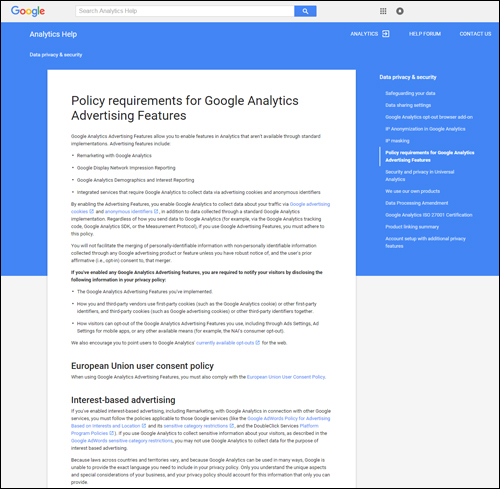
(Google Analytics – Policy Requirements)
Earning revenue online with your blog with Google AdSense advertising …
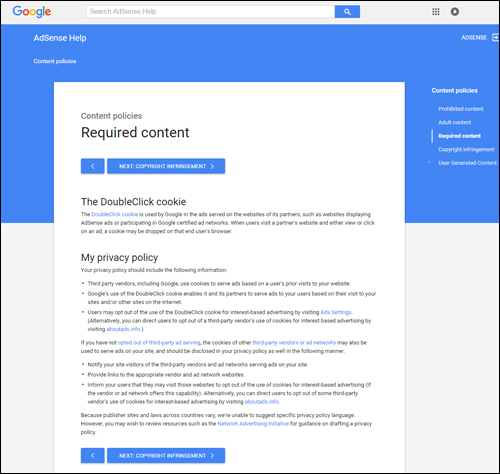
(Google AdSense - policy requirements)
And even promoting your services or products via Google AdWords …
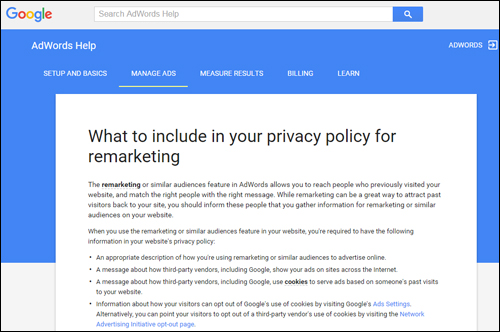
(Google AdWords – Policy Requirements)
If you sell information products with merchants like ClickBank, JVZoo, or other established merchant sites, you will be required to add various legal pages before your products are approved for selling via their networks …
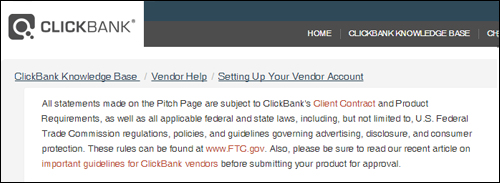
(Policy requirements for vendors selling via ClickBank)
The Federal Trade Commission (FTC) also requires you to include clear disclaimers and disclosures to visitors, especially when concerning the use of testimonials or product endorsements …
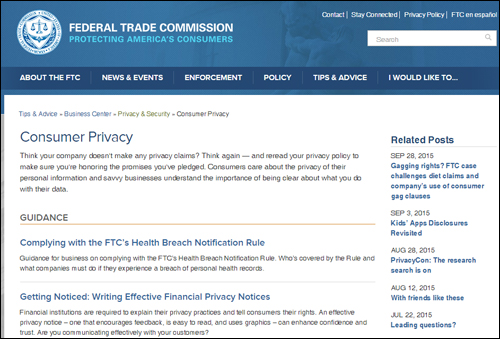
(Federal Trade Commission – consumer policies and regulations)
New FTC Regulations Require Your Site To Comply
FTC regulations governing how business is conducted online were introduced in March 2012. Search online and you will see that many sites are unaware (or choose to flaunt) these requirements. As is already the case, this typically results in the FTC making an example of businesses and prosecuting site owners for breaches of regulation in an effort to get other businesses to comply.
If you do any type of business online, therefore, it’s best not to take chances. Even if your business is not located in the U.S. we strongly recommend protecting your business by making sure that your site complies with all FTC regulations.
There are many resources online that can provide guidelines for structuring disclaimers and disclosures to help you comply with FTC requirements. We provide additional references and links to resources to some of these at the end of this article …
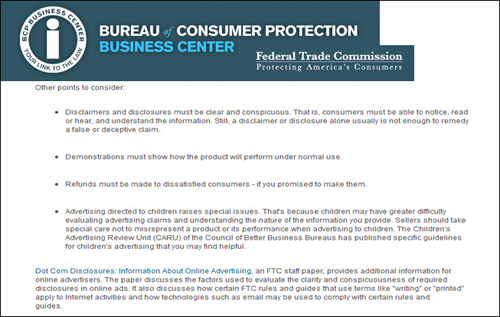
(You must structure your disclaimers and disclosures correctly to avoid running foul of laws and regulations)
Social Media Apps Also Require Compliance
If you plan to create applications that will integrate with your website, social networking sites like Twitter, Facebook, and others require you to provide access to various legal pages …
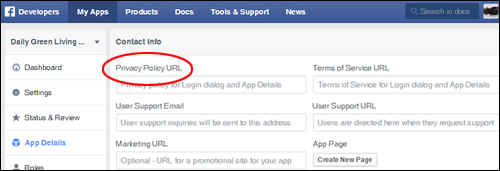
(Facebook developer app – policy requirements)
![]()
- If you are unsure as to whether you may be breaking the law, and/or Terms of Service policies and guidelines of websites like Google, Facebook, etc., then it’s best to assume that you most probably are.
- If you are considering promoting anything online via affiliate marketing, or monetizing your pages with Google AdSense, ads for Amazon or eBay products, or driving visitors to your site using Google AdWords, etc., then find out exactly what kind of legal information you are required to provide on your site to comply with their Terms Of Service and policy requirements to avoid having your accounts terminated.
- If you’ve been wondering if “borrowing” a Copyright Notice is Copyright infringement, take proper precautions to avoid becoming a litigation magnet.
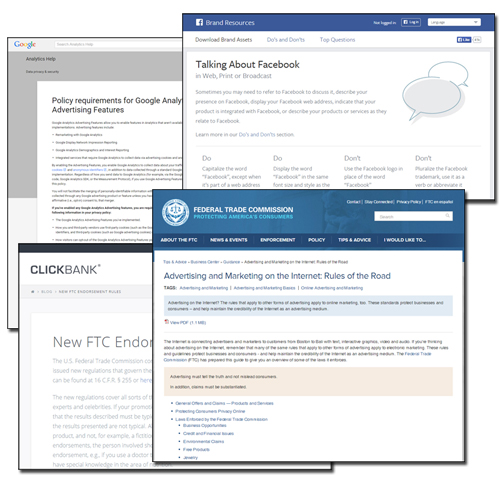
(In addition to legal and regulatory compliance, almost all third-party websites require you to comply with their terms of use)
What Legal Pages Do I Need To Add To My Website To Be Safe From Legal Compliance Issues?
If you suspect that your web site is falling short in aspects of compliance, then you will find this section helpful.
At its most basic, adding the following legal pages to your site will help your site keep out of trouble with most consumer protection authorities and external providers, and even help to avoid potential legal issues or even threats of legal action (e.g. “take down” notices):
- About Us Page
- Contact Us
- Privacy Statement
- Terms Of Use
- Disclaimer Pages
- General Data Protection Regulation (GDPR) Compliance
In addition to the above pages, you may want to consider adding one or more of these legal pages:
- Affiliate Agreement (e.g. if you sell products or services through an affiliate program)
- Anti-Spam Policy
- Earnings Disclaimer
- External Linking Policy
- Financial Disclaimers (e.g. if your website provides financial information)
- Refund Policy (if you sell products or services online)
- Media Terms Of Use (if you allow media downloads on your site)
Types Of Disclosure Pages
Adding correct disclosure information is important. For example:
- No Material Connection – Informs site users that you’re not being paid for writing the post.
- Affiliate Links – Notifies your visitors that you may derive some form of financial or similar kind of benefit if they act on your recommendation and buy through an affiliate link.
- Sample/Review Copy – Explains to visitors that you have received a sample or review copy of the product by the author or product developer.
- Sponsored Post – Disclosure that lets your readers know that you have been compensated in some way to write the content.
- Third Party Advertising – Lets visitors know that you’re using online behavioral tracking technology. This is required to comply with the “enhanced notice” the Better Business Bureau has been requiring online publishers to display prominently on their sites since January 1, 2014.
Adding Legal Pages Content To Your Website
Ideally, you should consult your lawyer or a legal firm and ask them to prepare the verbiage of your legal documents. Once you have this prepared, there are several ways to include them in your website.
Uploading Legal Web Pages Manually
If someone prepares the legal verbiage for you as standard web pages (e.g. HTML), you can simply upload these to your server, or have someone upload them for you.
We recommend creating a legals directory on your server and uploading HTML pages containing your legal documentation to this folder using FTP …
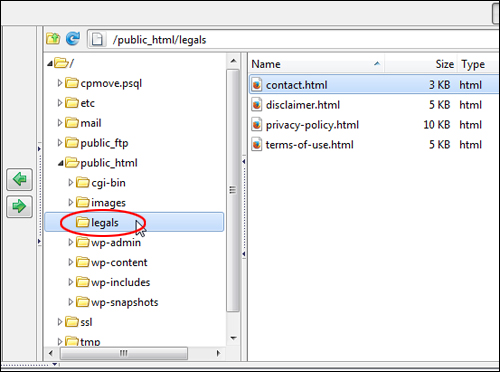
(Upload legal pages to your web server via FTP)
You can then add a link to these pages from your WordPress site using custom links in your menu feature …
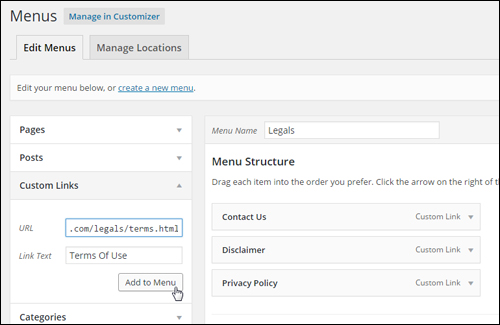
(Custom WordPress Menu)
Make sure that your legal pages are up-to-date and clearly visible to your visitors. You can insert links to your legal pages into the sidebar menu (or place them in the footer section of your site) so that users have access to the information from all pages …
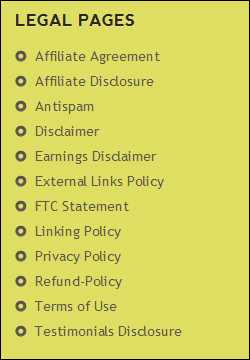
(Display legal pages to users on all of your site’s pages)
We have created a detailed tutorial on displaying links to pages on your sidebar or footer using widgets here:
Store-Bought Legal Templates
You can find downloadable attorney-drafted internet forms and agreements by searching online, or going to sites like the ones listed below:
Find Legal Forms
(FindLegalForms.com – Attorney-prepared legal forms)
More info:
Another option is to purchase a set of cut and paste legal templates written by attorney Scott Talbert to protect businesses online …
Cut And Paste Website Legal Pages
(Cut And Paste Website Legal Pages – Website Legal Pages)
These legal templates were written by an attorney and feature less passive voice and more plain language phrasing and can be customized with a quick search and replace to add your own details, then pasted into your pages.
The legal forms included in Scott Talbert’s Website Legal Pages include:
- Anti-Spam Policy
- Copyright Notice
- Disclaimer (multi-discipline professional disclaimers)
- DMCA Compliance
- FTC Compliance
- Privacy Policy: Google, DoubleClick DART, etc.
- Terms of Service & Conditions of Use.
You can either create a new page on your website for every legal form you want added to your website, then paste the content from the templates into your pages and publish or upload the pages to your web server as previously described.
To learn more, go here:
Legal Pages – Plugins
As well as using templates, another option is to use a plugin.
Here are some plugins for WordPress users worth looking into:
WP Legal Pages Plugin
(WordPress Legal Pages Plugin For WordPress)
If you don’t want to spend time creating legal web pages manually, then consider choosing WP Legal Pages instead …
This plugin is not free, but it’s a very low-priced and well-supported premium WordPress plugin that will help simplify the job of creating and implementing legal pages on your website and save you a great deal of time.
Here are just some of the reasons to consider using WordPress Legal Pages:
- Pre-written Legal Templates – Over 20 built-in legal templates created by professional lawyers.
- Very Quick And Easy To Use – You can set up most of your basic legal pages in a few minutes with a few clicks of the mouse.
- Customizable Pages – The plugin includes fully customizable and completely editable legal form templates (e.g. Terms of Use, Disclaimer, Earnings Disclaimer, Privacy Policy and more!)
- Editable Pages – WordPress content editor lets you edit legal pages like any other WP page.
- Custom Shortcodes Integration – Add shortcodes to any of your website or blog pages and the information will be automatically inserted into your pages when published.
- Exclude pages. The plugin lets you exclude pages from menus with a simple checkbox and delete and manage these like any other page on your website.
- Forced Options – Force page lock down. Page unlocks only when users agree to your terms.
- New Features – More features get added to this plugin with each new version.
After installing WordPress Legal Pages, a new menu item will be added to your main WordPress dashboard section …
(WordPress Legal Pages Plugin – Legal Pages Menu)
This lets you create, view and edit legal pages from your admin area …
(WP Legal Pages Plugin For WordPress – Settings Area)
With WPLegal Pages, you can create legal pages for different online uses, such as business websites with products, affiliate sites, AdSense sites, etc …
(WP Legal Pages Plugin For WordPress – Page type dropdown menu)
Choose from several pre-configured legal templates …
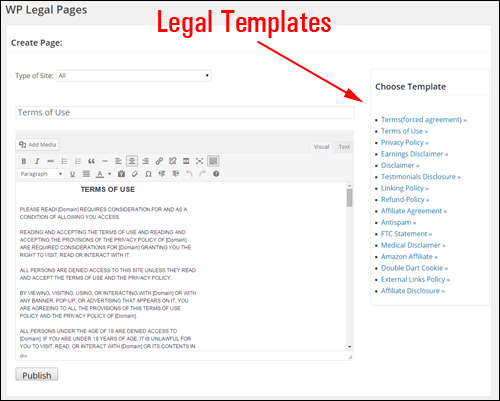
(WordPress Legal Pages – Legal Templates)
Legal page templates include:
- Terms of Use (Users are forced to agree to Terms and Conditions before using site)
- Linking Policy
- External Links Policy
- Terms and Conditions
- Refund Policy
- Affiliate Disclosure
- Privacy Policy
- Affiliate Agreement
- Facebook Privacy Policy
- Earnings Disclaimer
- Antispam Policy
- DoubleClick DART Cookies Policy
- Disclaimer Template
- FTC Disclosure Statement Template
- Medical Disclaimer Template
- Testimonials Disclosure – As per FTC guidelines
- Amazon Affiliate Disclosure Template
- DMCA Policy Template
- California Privacy Rights Policy Template
- Digital Goods Refund Policy Template
- COPPA – Children’s Online Privacy Policy Template
- Blog Comments Policy Template
- Newsletter Subscription Policy and Disclaimer Template
- FTC Disclaimer Widget
To learn more this WordPress plugin, visit the plugin website:
Compliance Bar – WordPress Website Compliance Plugin
Compliance Bar is a simple WordPress plugin that contains over 20 customizable compliance page templates for your online business …
For more details, visit the plugin site here:
Legal Suite Pro Plugin
(Legal Suite Pro Plugin)
This plugin lets you easily install professionally-written legal pages such as:
- Anti-Spam Policy
- Copyright Notice
- DMCA Compliance
- FTC Compliance
- Privacy Policy
- Social Media Disclosure
- Medical Disclaimer
- Terms of Service
- Earnings Disclaimer
(Legal Suite Pro – Professionally-written legal forms)
Additionally:
- Drag & Drop FTC Disclaimer Widget: Add an FTC Disclaimer to any WordPress sidebar or widget area.
- Customizable EU Cookie Compliance Bar: Display an EU cookie compliance bar if you are getting traffic from the EU and your sites use cookies.
With just one-click you can install almost all of the legal pages your site needs and these professionally written legal pages can be created in your theme and/or as a standalone page outside of your theme.
The plugin developers secured rights to high quality, professionally written legal disclaimers and packaged them into a plugin that can be installed quickly on any WordPress powered site. You can have legal pages installed and set up on your site in one minute or less and the license allows you to install and use the plugin on all of your sites.
More info:
![]()
If hiring a lawyer to create your legal pages is out of your budget, then at least consider implementing some kind of legal protection on your website until you can afford a lawyer.
We want your website to be protected!
Download the Legal Pages Generator software below (it’s FREE!), or consider using one of the better solutions we discuss in this article, such as using legal documentation, or plugins - see section below.

(Legal Pages Generator Software)
Legal Pages Generator Software allows you to easily generate essential legal documents for your website including Terms of Service, Privacy Statement, Copyright Notice, Website Disclaimer and Earnings Disclaimer.
***
As stated earlier, if you are making money online (or plan to), it’s important that your site is found to comply with legal requirements of government agencies that regulate how business online is done and any terms of service (TOS) and guidelines of 3rd-party services and products that you may be promoting or recommending online. If your website doesn’t comply with laws intended to protect the rights of consumers, you’re breaking the law.
Non-compliance puts you at risk of suffering both financial losses and the loss of your reputation. Why risk your money and reputation, when you can protect yourself so inexpensively?
![]()
Disclaimer: Once again, we are not lawyers and we provide no legal advice. You must do your own due diligence and consult legal experts to ensure that your website fully complies with the law concerning your specific business.
References And Legal Resources
Below is a useful list of additional sites we suggest you visit to better understand what your website may require to comply and meet its legal obligations:
- Federal Trade Commission Latest List Of Rules & Regulations
- FTC Advertising & Marketing Rules Of the Road
- FTC Advertising And Marketing On The Internet
- BBB – Online Interest-Based Advertising Accountability Program
- Dot Com Disclosures: Information About Online Advertising
- Restore Online Shoppers’ Confidence Act
- CAN-SPAM Act Guide
- Children’s Online Privacy Protection Rule
- FTC Regulatory Review Web Page
- FTC Rules and Guides Currently Under Review
- The Department of Commerce Internet Policy Task Force – Commercial Data Privacy and Innovation in the Internet Economy: A Dynamic Policy Framework
- FTC Staff Report: Self-Regulatory Principles for Online Behavioral Advertising
- FTC Final Guides Governing Endorsements and Testimonials
- United States Patent and Trademark Office
- US Copyright Office
In Addition …
- Analytics Help – Policy requirements for Google Analytics Advertising Features
- Google AdSense Program Policies Explained
- Google AdSense Help – Required Content
- Google AdWords – Information Collection And Use
- AdWords Help – What to include in your privacy policy for remarketing
- ClickBank – Creating Your First Product
- Facebook Platform Policies
We hope this article has helped you understand the importance of having a legally compliant website. Use the information presented above to quickly add all necessary legal pages to your WordPress website.
***
"I have used the tutorials to teach all of my clients and it has probably never been so easy for everyone to learn WordPress ... Now I don't need to buy all these very expensive video courses that often don't deliver what they promise." - Stefan Wendt, Internet Marketing Success Group

